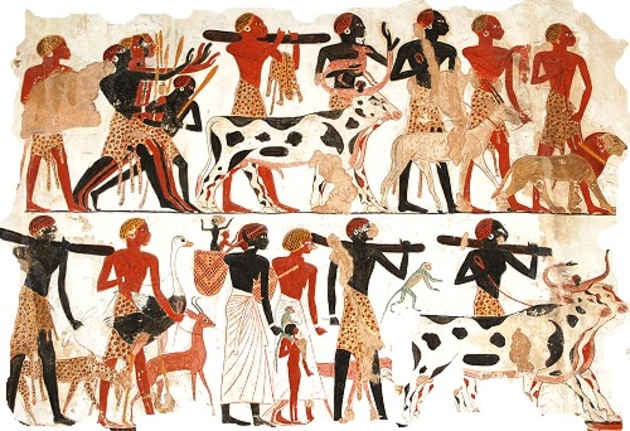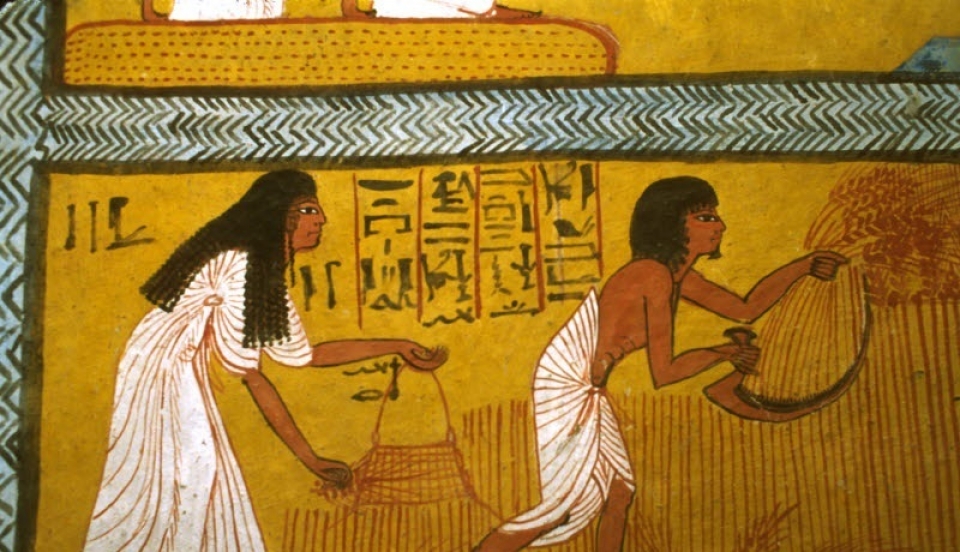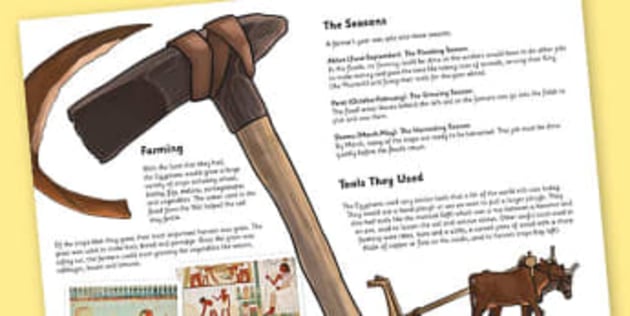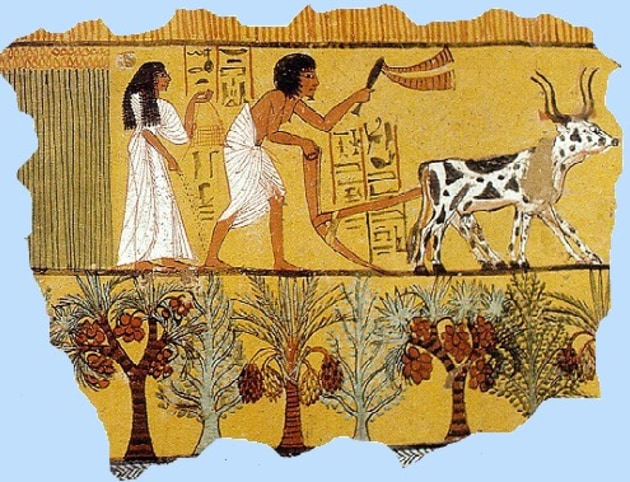What Conditions Allowed Ancient Egyptian Agriculture to Thrive
Thats why the where able to grow grains such as wheat and barley and industrial crops such as flax and papyrus and much more. What conditions allowed ancient Egyptian agriculture to thrive.

Egyptian Farming Educational Resource Teaching Wiki
The predictable flooding and controlled irrigation of the fertile valley produced surplus crops which supported a more dense population and social development and culture.

. This flooding saturated the usually dry soil. Who took the blame in ancient Egypt for flooding famine and other disasters. The agricultural practices of ancient Egyptians allowed them to grow stable food crops especially grains.
The civilization of ancient Egypt was indebted to the Nile River and its dependable seasonal flooding. Terms in this set 42 in the nile river valley. The predictable flooding and controlled irrigation of the fertile valley produced surplus crops which supported a more dense population and social development and culture.
The rivers predictability and fertile soil allowed the Egyptians to build an empire on the basis of great agricultural wealth. If the river did not flood there would be no fertile land. During what period of Egyptian history were the great pyramids built.
The land in the Nile was used as a source of agriculture since the land was very fertile and possessed very rich soil. After large river floods along the Nile many crops seemed to have been. On the coast of North Africa.
The Nile River with its predictable flooding and abundant natural resources allowed the ancient Egyptian civilization to thrive sustainably and culturally. Thats why the where able to grow grains such as wheat and barley and industrial crops such as flax and papyrus and much more. Who ruled the Old Middle and New Kingdoms.
The Nile River was the life line the heart of ancient Egyptian agriculture and thus survival. The civilization of ancient Egypt was indebted to the Nile River and its dependable seasonal flooding. Near the Red Sea and the Mediterranean Sea.
Predictable floodwaters and fertile soil. The people of ancient Egypt were able to discover that the river flooded at exactly the same time each year which allowed them to irrigate their fields and crops. The rivers predictability and fertile soil allowed the Egyptians to build an empire on the basis of great agricultural wealth.
The ancient Egyptians relied heavily on the Nile River for agriculture and trade. Agriculture was only possible in Egypt to the the flooding and irrigation of the Nile River. The Nil made life possible.
I believe the most important reason ancient Egypt flourished is irrigation. Each year the Nile River flooded. The Nile river was the most important aspect in Egyptian farming and agriculture since it was the only source of water due to having little to no rainfall.
Which statement best describes the geographical location of ancient Egypt. The area was desert with little rainfall. Who took the blame in ancient Egypt for flooding famine and other disasters.
They where able to thrive in there agriculture because of their irrigation system they had. Despite its rather unpredictable nature the river was still considered a seasonal one going through periods of extreme wet and dry cycles referred to as humid and arid cycles respectively Olszewski262. Egyptians are credited as being one of the first groups of people to practice agriculture on a large scale.
Farmers planted their crops in the muddy flats which allowed for good crops almost each and every time. Hence the emphasis on life after death and the preservation of knowledge of the past. Which statement best describes the geographical location of ancient Egypt.
Start studying Ancient Egypt Chapter 4. What main economic activity. They where able to thrive in there agriculture because of their irrigation system they had.
Learn vocabulary terms and more with flashcards games and other study tools. The Nile River helped the ancient Egyptians to thrive. The success of ancient Egyptian civilization came partly from its ability to adapt to the conditions of the Nile River valley for agriculture.
In addition ancient Egyptians practiced a kind of sustainable agriculture by adapting their farming along the Nile valley to the ecological condition 8 which allowed their civilization to thrive and endure. Egypt is full of dry barren deserts and the Nile is a major source of water for agriculture. Near the Red Sea and the Mediterranean Sea.
What conditionsresources allowed ancient Egyptian agriculture. The predictable flooding and controlled irrigation of the fertile valley produced surplus crops which supported a more dense population and social development and culture. Next to the Sahara.
Without the river there would be no life because they needed the river for agriculture. Describes the geographical location of ancient Egypt. The success of ancient Egyptian civilization came partly from its ability to adapt to the conditions of the Nile River valley for agriculture.
Much of the surviving art comes from tombs and monuments. This came from The Nile River which provided the ability to fish boat trade and improve agriculture. Another reason ancient Egypt flourished is also related to its geographical location.
The success of ancient Egyptian civilization came partly from its ability to adapt to the conditions of the Nile River valley for agriculture. Silt deposits developed and the river waters helped to create fertile soil. What conditions allowed ancient Egyptian agriculture to thrive.
Why is the river Nile associated to Egypt.

Egyptian Farming Educational Resource Teaching Wiki

Ancient Egyptian Agriculture Food And Agriculture Organization Of The United Nations

Comments
Post a Comment